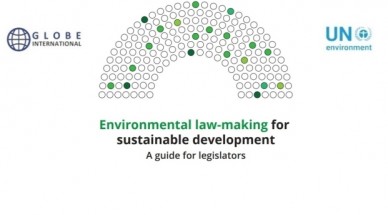Environmental Law-making & Oversight for Sustainable Development: A guide for legislators
- Legislative & Institutional Assessments of REDD+ Readiness in the DRC, Nigeria and Senegal
- Legislative & Institutional Readiness Assessments for the implementation of Environmental Economic Accounting in the DRC, Nigeria and Senegal
- Climate Change Governance & the Challenge of Multi-Level Action
- Climate Change Laws and Policies in Climate Vulnerable Forum (CVF) Countries
- Legislative & Institutional Readiness Assessments on the Great Green Wall in Nigeria and Senegal
- Parliaments & the Paris Agreement
Following on from ‘Bringing the 2015 Summits Home: A Guide for Legislators’ (2016), the Guide is designed to support the daily work of national legislators and parliamentarians.
 GLOBE International & UN Environment have just published their latest joint report, Environmental law-making for sustainable development: A guide for Legislators, addressing international environmental lawmaking and sustainable development in the post-2015 era. Following on from their ‘Bringing the 2015 Summits Home: A Guide for Legislators’(2016), the Guide is designed to support the daily work of national legislators and parliamentarians to:
GLOBE International & UN Environment have just published their latest joint report, Environmental law-making for sustainable development: A guide for Legislators, addressing international environmental lawmaking and sustainable development in the post-2015 era. Following on from their ‘Bringing the 2015 Summits Home: A Guide for Legislators’(2016), the Guide is designed to support the daily work of national legislators and parliamentarians to:
(1) craft environmental laws that enable delivery of the post-2015 commitments and their vision of sustainable development,
(2) guide, scrutinise and oversee decision-making by executive governments,
(3) allocate resources for environmental assets and governance, and
(4) build effective collaborations, contacts and capacity to deliver the post-2015 commitments.
It asks a number of key questions:
How are these important functions of parliaments being reshaped in the post-2015 era of sustainable development? How can legislators and parliamentarians do their part to ensure that the SDGs and other post-2015 commitments are achieved by 2030 and beyond? The overarching purpose of this Guide is to provide formative answers to these questions that are practically useful in the daily work of legislators and legislative officials around the world.
Drawing on examples from around the world, the guide outlines options and essential features for a new generation of ‘post-2015’ environmental law-making—one that acknowledge the environment’s role as a foundation of development that must be conserved, restored and enhanced in order to build a better world by 2030 and beyond.
The Guide can be downloaded here, and at https://www.unenvironment.org/resources/publication/environmental-law-making-sustainable-development-guide-legislators
